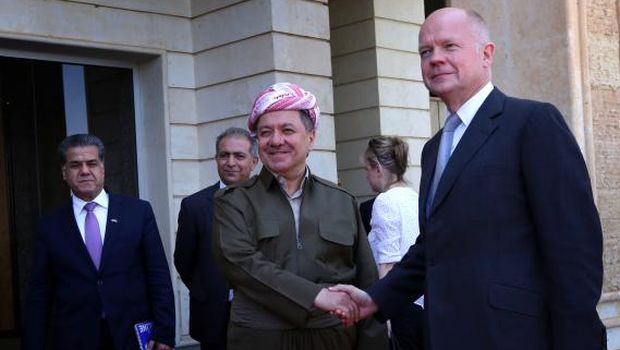
Iraqi Kurdish leader Massoud Barzani, center, welcomes British Foreign Secretary William Hague, right, in Erbil, the capital of Iraq’s autonomous region of Kurdistan, on June 27, 2014. (AFP Photo/Safin Hamed)
London, Asharq Al-Awsat—The federal government in Baghdad must now accept that Kirkuk is a part of the autonomous Kurdistan region, a senior Kurdistan Regional Government (KRG) official has said, echoing earlier comments by Kurdish President Massoud Barzani.
Speaking exclusively to Asharq Al-Awsat, Mohammed Ihsan said: “Things have changed after June 10 and the Iraqi government must deal with the new reality.”
Sunni Islamist militants led by the Al-Qaeda breakaway group, the Islamic State of Iraq and Syria (ISIS), made a lightening advance throughout Iraqi territory on June 10, capturing vast swaths in the country’s northern and western regions.
After ISIS’s advance into Nineveh province, with the group taking its capital city Mosul, and the subsequent withdrawal of Iraqi government forces from surrounding areas, Kurdish army units—known as the Peshmerga—announced on June 12 they had taken control of the city of Kirkuk, which has a sizable Kurdish population, and lies some 103 miles (166 kilometers) west of Mosul.
“Today, and after June 10 . . . Peshmerga forces had to fill this vacuum to defend the lives of Iraqis in Kirkuk and repel attempts by armed groups to reach the [Kurdistan] region’s territories,” he added.
Ihsan, who is the KRG official in charge of implementing Article 140 of the Iraqi constitution, which specifies that the city’s status, whether Kurdish or Arab, must be decided via a referendum, said that “the Kurds have waited more than 10 years to implement Article 140, but there are . . . [hardliners] in the Iraqi government and parliament who . . . [denied Article 140] existed, and the federal government in Baghdad did not take any steps to implement [it].”
This follows comments by KRG President Barzani, who after a meeting with British Foreign Secretary William Hague in the Kurdistan region’s capital Erbil on Friday announced that “Kurdish control over Kirkuk and other areas disputed with Baghdad is final,” adding that he considered Article 140 no longer valid.
Ihsan, who is in London to attend a conference on Iraq held at the London School of Economics, added: “The [federal] governments which came after 2003, except Iyad Allawi’s government, did not adhere to Article 140, but tried to delay it.”
He said that before the constitution was published, Allawi had formed a committee to implement a mechanism to hold a referendum among the residents of Kirkuk and other disputed areas over whether or not to join the Kurdistan region; however, the committees which came after the Allawi government simply ignored the issue.
Speaking of international reaction to President Barzani’s announcements regarding to status of Kirkuk, Ihsan said: “The international position too will accept these realities, evidenced by the fact that President Barzani announced his decision to take Kirkuk back during a meeting with British Foreign Secretary William Hague, and the fact that the US secretary of state [John Kerry] was in Erbil a few days ago, and I think he was aware of the background of the decision.”
He added: “So far, there have been no reactions, whether negative or positive . . . [regarding] the decision. We are even certain that Turkey and Iran will be satisfied with the decision to incorporate Kirkuk into the region as their borders will be safe from terrorism, and there are joint interests between Turkey and the Kurdistan region, and the same applies to Iran.”
Turkey, whose own Kurdish population has long complained of disenfranchisement, has previously been nervy about Kurdish independence in Iraq for fears this will embolden Kurds within its own territory to seek similar concessions from Ankara.
But relations have warmed in recent years, with Turkish Prime Minister Recep Tayyip Erdoğan using the word “Kurdistan” for the first time during a meeting with President Barzani last November, marking a turning point in Kurdish–Turkish relations. Ankara is now the KRG’s largest trading partner, with the latter using Turkey’s Ceyhan port to store and export its oil independently of Baghdad, another recent sticking point between the KRG and the federal government.
Iran is a supporter of Baghdad’s Shi’ite-dominated government, led by Prime Minister Nuri Al-Maliki, and has promised to support Iraq against the Sunni Islamist advance.
The KRG has been locked in a longstanding dispute over territory with the federal government in Baghdad, with the Kurds seeking complete autonomy from Iraq.

Trackbacks/Pingbacks